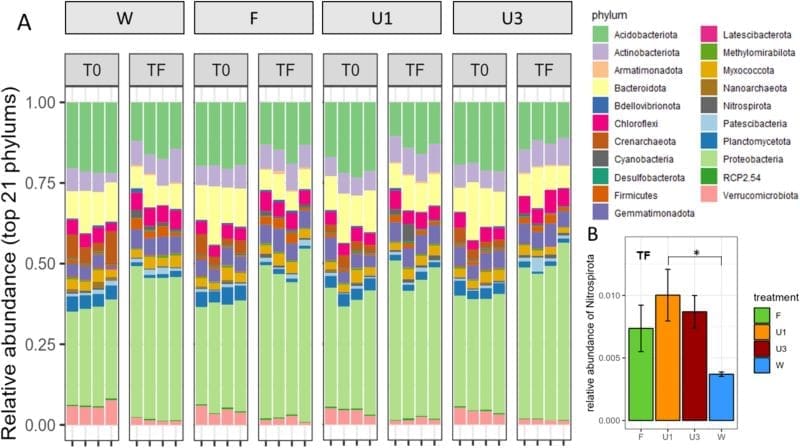Human urine could offer a sustainable alternative to synthetic fertilizers, according to new research by scientists from the University of Birmingham and L’Institut Agro Montpellier.
The study, published in Applied Soil Ecology, found that using one-year stored urine as fertilizer had a minimal effect on soil bacterial communities, soil pH, and salinity, making it a viable eco-friendly option for crop fertilization.

Minimal impact on soil microbiome
The study highlights that soil bacterial communities are resilient to urine fertilization, responding similarly to how they react to synthetic fertilizers. Even when applied in high doses, urine had a negligible impact on the overall composition of soil bacteria. This finding is crucial, as soil microbiomes play a vital role in maintaining healthy soil ecosystems and nutrient cycles.
Co-author Manon Rumeau from the University of Birmingham emphasized the benefits: “Our research highlights the potential of recycling human urine to enhance agricultural sustainability, reduce wastewater pollution, and decrease reliance on synthetic fertilizers.”
In the study, urine fertilization was tested on spinach crops under greenhouse conditions. Scientists compared two doses of stored urine with synthetic fertilizer and water treatments across four soil tanks. Despite concerns about the potential effects on soil health, only 3% of bacterial groups were impacted by the application of urine, and the higher salt concentrations found in urine showed little effect on the soil bacterial communities.
Stored urine: safe and rich in nutrients
Fresh urine is composed of approximately 95% water and 5% amino compounds, such as urea and creatinine, as well as organic anions and inorganic salts. This composition makes it a valuable source of bioavailable nutrients and micronutrients necessary for plant growth.
However, fresh urine contains a variety of microorganisms, making it unsuitable for immediate use in agriculture. The research found that storing urine for 12 months effectively reduces its microbiome and neutralizes most pathogenic bacteria due to increased pH levels (about 9 rather than 6.5 for fresh urine) and higher free ammonia concentration.
As a result, stored urine becomes a safer option for fertilization. It can be applied without causing harm to the soil or crops, offering a solution to reduce synthetic fertilizer use while repurposing human waste in an environmentally sustainable way.
Potential risks
Despite the positive results, the study did identify some risks associated with urine fertilization. The researchers observed that urine application increased the relative presence of nitrifying and denitrifying bacterial groups, which could lead to higher emissions of nitrogen oxides, potent greenhouse gases. While these changes were minimal, the researchers recommend further long-term studies to assess the broader environmental impact of nitrogen oxide production and soil salinity under urine fertilization.
The increasing interest in recycling human urine as a crop fertilizer reflects broader efforts to reduce the environmental footprint of agriculture. Synthetic fertilizers, while effective, have been linked to a range of ecological issues, including water pollution and greenhouse gas emissions. By contrast, urine offers a readily available and renewable resource for nutrient recycling.
Rumeau and her team underscore the importance of continued research into urine-based fertilization to ensure it can be safely integrated into agricultural practices. “Stored urine can be safely applied to a plant-soil system without negatively impacting the soil microbiome,” she noted.
Further studies will help assess the long-term impacts and refine urine application techniques to maximize benefits while mitigating any potential risks.
The use of stored human urine as fertilizer presents a promising opportunity to enhance sustainability in agriculture. This new study confirms that urine fertilization has minimal adverse effects on soil bacterial communities and soil health. While further research is needed, particularly concerning nitrogen oxide emissions, human urine could become an essential component of sustainable agricultural practices, helping reduce the reliance on synthetic fertilizers and cut down on wastewater pollution.
Journal Reference:
Manon Rumeau, Chiara Pistocchi, Nassim Ait-Mouheb, Claire Marsden, Brigitte Brunel, ‘Unveiling the impact of human urine fertilization on soil bacterial communities: A path toward sustainable fertilization‘, Applied Soil Ecology 201 (2024). DOI: 10.1016/j.apsoil.2024.105471
Article Source:
Press Release/Material by University of Birmingham
Featured image credit: Freepik




